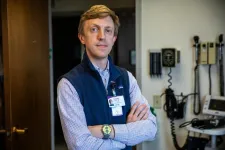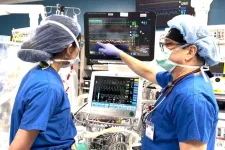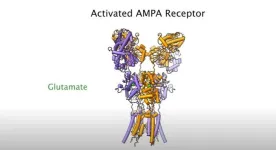(Press-News.org) INDIANAPOLIS – A new, healthy liver offers the best survival for patients with early-stage liver cancer. But a new study, led by Katie Ross-Driscoll, PhD, MPH, of Regenstrief Institute and Indiana University School of Medicine Department of Surgery, has identified disparities in liver transplant referral and evaluation, which must precede waitlisting, for these potentially lifesaving procedures.
While other studies have demonstrated disparities in placement on organ waitlists, the new study is one of the first to examine the transplant process prior to liver transplant waitlisting -- following patient progress along the continuum immediately after liver cancer diagnosis.
“Undergoing a transplant, which is the only cure for liver cancer, requires patients to navigate a very complex process after diagnosis,” said Dr. Ross-Driscoll. “If referred to a transplant center, the patient needs to follow up on the referral and then complete a comprehensive medical and psychosocial evaluation. After this evaluation, transplant centers will decide whether or not to place patients on the deceased donor waiting list. We examined progress through the steps prior to placement on the waiting list and found that different factors predicted whether these pre-transplant steps are completed.”
Factors associated with whether or not a patient received a referral from their physician to a transplant center after diagnosis of liver cancer:
Age: the older the patient (up to age 70, the cutoff age for transplant eligibility) the less likely they were to receive a referral.
Insurance type: Patients who had Medicare, Medicaid or other non-private insurance types were less likely to receive a referral than patients with private insurance.
Of those patients who were referred to a transplant center:
Black patients were less likely than White patients to initiate a transplant evaluation.
Patients who lived in higher poverty neighborhoods were less likely to initiate the evaluation than patients who lived in lower poverty neighborhoods.
Of those patients who initiated the medical and psychosocial evaluation, those who had Medicaid insurance were about half as likely to complete all necessary steps of the evaluation process as patients with private insurance.
“These findings indicate patients with liver cancer who are older (but under the cutoff age for eligibility), poorer, Black or Medicaid beneficiaries are less likely than others to make it through the early steps of the transplant process,” said Dr. Ross-Driscoll. “While our results are based on cancer registry data from patients referred to Georgia’s two transplant centers, we believe that our findings are potentially relevant across the United States. Future studies are needed to understand how barriers might vary across transplant centers.”
“There are very few studies documenting the steps prior to liver transplant waitlisting, and these results suggest the need to collect pre-waitlisting data nationally to inform where interventions should be targeted to improve equity in access to liver transplantation, said co-author Rachel Patzer, PhD, MPH., Regenstrief Institute president and CEO.
Liver cancer is one of the fastest growing cancers in the United States and shows no indication of slowing down. As liver cancer becomes more prevalent, understanding pathways to care for these patients becomes more important.
“Disparities in Access to Liver Transplant Referral and Evaluation among Patients with Hepatocellular Carcinoma in Georgia” is published in the peer-reviewed journal Cancer Research Communications. This work was supported by the National Center for Advancing Translational Sciences of the National Institutes of Health.
Authors and affiliations:
Katherine Ross-Driscoll 1 2 3, Arrey-Takor Ayuk-Arrey 2, Raymond Lynch 4, Lauren E McCullough 3 5, Giorgio Roccaro 6, Lauren Nephew 7, Jonathan Hundley 8, Raymond A Rubin 8, Rachel Patzer 1 9
1Division of Transplantation, Department of Surgery, Indiana University School of Medicine, Indianapolis, Indiana.
2Center for Health Services Research, Regenstrief Institute, Indianapolis, Indiana.
3Department of Epidemiology, Rollins School of Public Health, Atlanta, Georgia.
4Division of Transplantation, Department of Surgery, Pennsylvania State University School of Medicine, Hershey, Pennsylvania.
5Winship Cancer Institute, Emory University, Atlanta, Georgia.
6Division of Digestive Diseases, Department of Medicine, Emory University School of Medicine, Atlanta, Georgia.
7Division of Gastroenterology and Hepatology, Department of Medicine, Indiana University, Indianapolis, Indiana.
8Piedmont Transplant Institute, Piedmont Healthcare, Atlanta, Georgia.
9Regenstrief Institute, Indianapolis, Indiana
Katie Ross-Driscoll, PhD, MPH
In addition to her role as a research scientist with Regenstrief Institute, Katie Ross-Driscoll, PhD, MPH, is an assistant professor of surgery at Indiana University School of Medicine. She is a health services researcher and epidemiologist focused on organ transplantation.
Rachel Patzer, PhD, MPH
In addition to her roles as president and CEO and research scientist with Regenstrief Institute, Rachel Patzer, PhD, MPH, serves as the Leonard Betley Professor of Surgery at Indiana University School of Medicine and an adjunct professor at IU Richard M. Fairbanks School of Public Health. Dr. Patzer is an epidemiologist and health services researcher with a strong focus on healthcare access, quality of healthcare delivery and outcomes. Her research centers on such key areas as disparities, social determinants of health, community-based participatory research, predictive analytics, healthcare quality and health policy evaluations. She has been instrumental in reshaping the national organ transplantation paradigm, advocating for a population health approach to inform quality measures, policies and equitable solutions.
END
Older, poorer, Black, Medicaid beneficiaries less likely to be placed on liver transplant lists
Study finds disparities in access to liver transplantation occur before waitlisting
2024-06-10
ELSE PRESS RELEASES FROM THIS DATE:
Imposing cost-efficient trade sanctions
2024-06-10
By Alistair Jones
SMU Office of Research – Global condemnation of Russia over its invasion of Ukraine has prompted the imposition of trade sanctions. Such measures are a form of economic coercion, commonly used for reasons of foreign policy.
Trade sanctions can be put in place in an attempt to alter objectionable behaviour – in Russia's case, waging a war – or to punish an offending state through the disruption of economic exchange.
"Sanctions can be in many forms and raising ...
Statins for heart disease prevention could be recommended for far fewer Americans if new risk equation is adopted
2024-06-10
PITTSBURGH – If national guidelines are revised to incorporate a new risk equation, about 40% fewer people could meet criteria for cholesterol-lowering statins to prevent heart disease, according to a study by researchers at the University of Pittsburgh, Beth Israel Deaconess Medical Center and University of Michigan. Published today in JAMA Internal Medicine, the study examines the potential impact of widespread adoption of the PREVENT equations, which were released by the American Heart Association ...
Multicenter clinical study supports safety of deep general anesthesia
2024-06-10
General anesthesia makes it possible for millions of patients each year to undergo lifesaving surgeries while unconscious and free of pain. But the 176-year-old medical staple uses powerful drugs that have stoked fears of adverse effects on the brain — particularly if used in high doses.
New findings published June 10 in the Journal of the American Medical Association (JAMA), however, support an earlier study that indicates that anesthesia is no more hazardous for the brain at higher doses than at lower doses, ...
Cancer incidence trends in successive social generations in the US
2024-06-10
About The Study: In this model-based cohort analysis of incident invasive cancer in the general population, decreases in lung and cervical cancers in Generation X may be offset by gains at other sites. Generation X may be experiencing larger per-capita increases in the incidence of leading cancers than any prior generation born in 1908 through 1964. On current trajectories, cancer incidence could remain high for decades.
Corresponding Author: To contact the corresponding author, Philip S. Rosenberg, Ph.D., email rosenbep@mail.nih.gov.
To access the embargoed study: Visit ...
Global prevalence of overweight and obesity in children and adolescents
2024-06-10
About The Study: This study’s findings indicated 1 of 5 children or adolescents experienced excess weight and that rates of excess weight varied by regional income and Human Development Index. Excess weight among children and adolescents was associated with a mix of inherent, behavioral, environmental, and sociocultural influences that need the attention and committed intervention of primary care professionals, clinicians, health authorities, and the general public.
Corresponding Author: To ...
Severe pediatric neurological manifestations with SARS-CoV-2 or MIS-C hospitalization and new morbidity
2024-06-10
About The Study: The results of this study suggest that children and adolescents with acute SARS-CoV-2 or multisystem inflammatory syndrome in children (MIS-C) and severe neurological manifestations may be at high risk for long-term impairment and may benefit from screening and early intervention to assist recovery.
Corresponding Author: To contact the corresponding author, Ericka L. Fink, M.D., M.S., email finkel@ccm.upmc.edu.
To access the embargoed study: Visit our For The Media website at this link https://media.jamanetwork.com/
(doi:10.1001/jamanetworkopen.2024.14122)
Editor’s ...
Elephants have names for each other like people do, new study shows
2024-06-10
Colorado State University scientists have called elephants by their names, and the elephants called back.
Wild African elephants address each other with name-like calls, a rare ability among nonhuman animals, according to a new study published in Nature Ecology and Evolution.
Researchers from CSU, Save the Elephants and ElephantVoices used machine learning to confirm that elephant calls contained a name-like component identifying the intended recipient, a behavior they suspected based on observation. When the researchers played back recorded calls, elephants responded affirmatively ...
In a significant first, researchers detect water frost on solar system’s tallest volcanoes
2024-06-10
PROVIDENCE, R.I. [Brown University] — An international team of planetary scientists has detected patches of water frost sitting atop the Tharsis volcanoes on Mars, which are not only the tallest volcanic mountains on the Red Planet but in the entire solar system.
The discovery marks the first time frost has been spotted near the planet’s equator, challenging existing perceptions of the planet’s climate dynamics, according to the team’s new study in Nature Geoscience.
“We thought it was improbable for frost to form around Mars’ equator, as the mix ...
Super-chilled brain cell molecules reveal how epilepsy drug works
2024-06-10
FOR IMMEDIATE RELEASE
By super cooling a molecule on the surface of brain cells down to about minus 180 degrees Celsius — nearly twice as cold as the coldest places in Antarctica — scientists at Johns Hopkins Medicine say they have determined how a widely-used epilepsy drug works to dampen the excitability of brain cells and help to control, although not cure, seizures.
The research, published June 4 in Nature Structural & Molecular Biology, identifies critical connections between activity of the epilepsy drug ...
Benefits of failure are overrated
2024-06-10
The platitude that failure leads to success may be both inaccurate and damaging to society, according to research published by the American Psychological Association.
Researchers conducted 11 experiments with more than 1,800 participants across many domains and compared national statistics to the participants’ responses. In one experiment, participants vastly overestimated the percentage of prospective nurses, lawyers and teachers who pass licensing exams after previously failing them.
“People expect success to follow failure much more often than it actually does,” said lead researcher Lauren Eskreis-Winkler, PhD, an assistant ...
LAST 30 PRESS RELEASES:
Reconstructing the world’s ant diversity in 3D
UMD entomologist helps bring the world’s ant diversity to life in 3D imagery
ESA’s Mars orbiters watch solar superstorm hit the Red Planet
The secret lives of catalysts: How microscopic networks power reactions
Molecular ‘catapult’ fires electrons at the limits of physics
Researcher finds evidence supporting sucrose can help manage painful procedures in infants
New study identifies key factors supporting indigenous well-being
Bureaucracy Index 2026: Business sector hit hardest
ECMWF’s portable global forecasting model OpenIFS now available for all
Yale study challenges notion that aging means decline, finds many older adults improve over time
Korean researchers enable early detection of brain disorders with a single drop of saliva!
Swipe right, but safer
Duke-NUS scientists identify more effective way to detect poultry viruses in live markets
Low-intensity treadmill exercise preconditioning mitigates post-stroke injury in mouse models
How moss helped solve a grave-robbing mystery
How much sleep do teens get? Six-seven hours.
Patients regain weight rapidly after stopping weight loss drugs – but still keep off a quarter of weight lost
GLP-1 diabetes drugs linked to reduced risk of addiction and substance-related death
Councils face industry legal threats for campaigns warning against wood burning stoves
GLP-1 medications get at the heart of addiction: study
Global trauma study highlights shared learning as interest in whole blood resurges
Almost a third of Gen Z men agree a wife should obey her husband
Trapping light on thermal photodetectors shatters speed records
New review highlights the future of tubular solid oxide fuel cells for clean energy systems
Pig farm ammonia pollution may indirectly accelerate climate warming, new study finds
Modified biochar helps compost retain nitrogen and build richer soil organic matter
First gene regulation clinical trials for epilepsy show promising results
Life-changing drug identified for children with rare epilepsy
Husker researchers collaborate to explore fear of spiders
Mayo Clinic researchers discover hidden brain map that may improve epilepsy care
[Press-News.org] Older, poorer, Black, Medicaid beneficiaries less likely to be placed on liver transplant listsStudy finds disparities in access to liver transplantation occur before waitlisting





